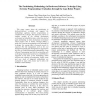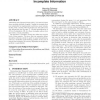1557 search results - page 160 / 312 » Agent- Oriented Software Development: A Case Study |
IWPC
2005
IEEE
15 years 3 months ago
2005
IEEE
The fact that crosscutting concerns (aspects) cannot be well modularized in object oriented software is an impediment to program comprehension: the implementation of a concern is ...
COMPSAC
2008
IEEE
15 years 4 months ago
2008
IEEE
During the development and maintenance of ObjectOriented (OO) software, the information on the classes which are more prone to be changed is very useful. Developers and maintainer...
IEEECIT
2006
IEEE
15 years 4 months ago
2006
IEEE
This paper argues about the partitioning in hardware/software co-design and suggests the methodology applying extreme programming to complement the co-design. This approach, contr...
ATAL
2010
Springer
14 years 11 months ago
2010
Springer
Alternating-time Temporal Logic (ATL) [1] is used to reason about strategic abilities of agents. Aiming at strategies that can realistically be implemented in software, many varia...
HICSS
2003
IEEE
15 years 3 months ago
2003
IEEE
Use case models capture and describe the functional requirements of a software system. A use case driven development process, where a use case model is the principal basis for con...


